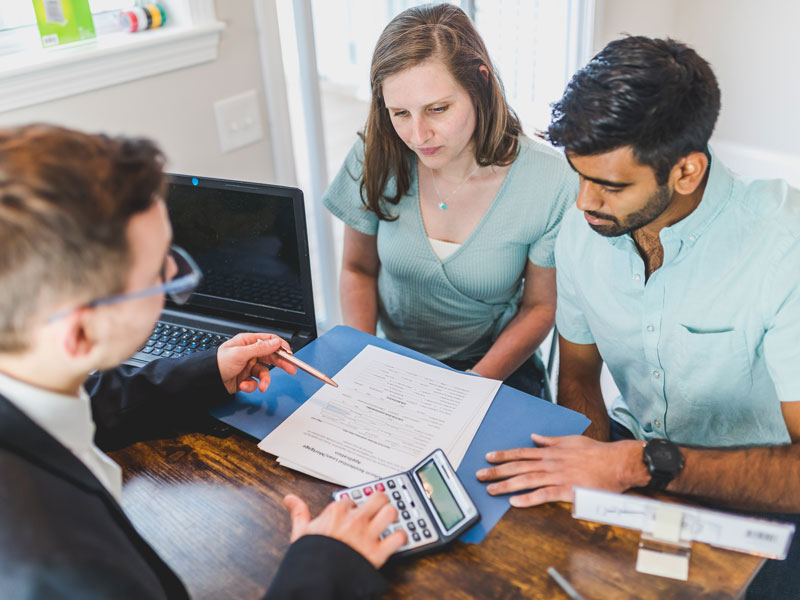Buying Process
Premium Group Realty
Buying a House
Purchasing a home might appear like a formidable undertaking; it could be the most expensive and emotionally charged acquisition you make in your lifetime. With thorough research and determination, the keys to that dream house can become yours. We will guide you on your journey towards homeownership."

Get ready:
How much House Can I Afford?
To determine how much you can spend on a home, take a close look at your budget. Review your bank statements and spending habits for the last couple of months to figure out how much you are spending on everything from cellphone bills to streaming services to your weekly restaurant takeout.
Once you have a better picture of your spending habits, determine how much you want to allocate toward a monthly home payment. This figure includes your principal, interest, tax, and insurance payments, which add up to your monthly mortgage sum.
The Federal Housing Administration formula, used by many lenders, recommends allocating no more than 31 percent of your monthly income to your housing payment

Step 1: Get a Mortgage Preapproval
A pre-approval letter is a written estimate from a lender of how much you will likely be able to borrow from them. This letter will help you determine how much you can afford, and help demonstrate that you can secure a home loan when you are ready to make an offer on a house.
Getting pre-approved for a mortgage is different from getting prequalified for a loan, which is essentially a back-of-the-envelope calculation of how much of a loan you may qualify for based on unverified information.
The preapproval application for a mortgage often requires submitting pay stubs, bank statements, tax returns, and other financial documents. Take the time to get one now, so you're ready to make an offer as soon as you find a home you love.

Step 2: Find a great real estate agent in New
You can find homes for sale on your own, but a good broker can help you make sound decisions and guide you through the home-buying process. A broker can also help you get access to homes as soon as they hit the market, before they may be listed online.
When you find a home you love, your agent becomes your trusted adviser, assisting you with:
- Negotiating the Offer
- Inspections
- Hiring an Attorney
- Appraisal Process
- Consulting a Mortgage
- Professional final inspection
- Closing Process

Step 3 The Search for a New Home
Now that you have a better sense of your budget and you have trusted
Real Estate agent from PGR, figure out where you want to live.
* Choose a Neighborhood, * Analyze Your Market, * Go to Open houses - just time to tour- and make an offer with our PGR real estate agent, If the offer is accepted, a cash deposit, also known as “earnest money,” is often required to show good faith. (This money will be held in an escrow account until closing, and will ultimately go toward your down payment.)
While the specific process and legal requirements vary in different parts of the country, the formal offer should explain the terms and conditions of the purchase.

Step 4 Closing
Getting from an accepted offer to closing requires patience and organization.
Once your bid on a house is accepted, you set in motion the process that will take you to finally holding a set of keys in your hand. While you may be eager to move into your new place, it is in your best interest to do your due diligence to make sure you get a home that it is in good condition and at a good rate.
Apply for a Mortgage: Get a mortgage broker to do the work for you.
Because mortgage brokers are not tied to any one lender, they can save you time and hassle by doing the legwork for you.
Note: A broker is paid a fee set as a percentage of the loan amount, but this may be paid by the lender.

Step 5. Close the Deal
On closing day, all parties involved — the seller, the buyer, and their various representatives — will sign the papers officially sealing the deal. (Parties may not always need to be present for the official closing — DocuSign, as well as new remote notarization laws that are gaining popularity because of the pandemic, have increasingly digitized the process). Buyers must bring a check to cover closing costs, including title search fees, attorneys’ fees, transfer taxes, and homeowner’s insurance. When all the documents have been signed, and all funds have been properly distributed, the deed of ownership will be transferred to you.
Celebrate!
Finally, the place is yours. Take your new set of keys and enjoy the first time entering your (likely empty) home and start to picture your new life inside its walls.
Get ready:
Know Your Mortgage Payment
Based on the home's sale price, the term of the loan, buyer's down payment percentage, and the loan's interest rate, this calculator can help estimate what you'll need to pay out monthly for your new home. This calculator factors in PMI (Private Mortgage Insurance) for loans with less than a 20% down payment, as well as town property taxes and its effect on the total monthly mortgage payment.
Buying a home is a big step! Whether you're buying your first home, your dream home, or your tenth investment property, yours will be a big investment. We know how important this is to you and we have an army of experts to make sure we find the perfect property for your unique circumstances. Finding the perfect property is just one way we can help you with your real estate purchase.
In order to determine the amount of home you can afford a lender will use your debt-to-income ratio to determine the percentage of your pre-tax income you spend on debt. Your debt ratio will include: monthly housing costs, car payments, credit cards, student loans, and any other installment debt. If you take on more debt before buying a home it will have an impact on the amount of the loan that the



